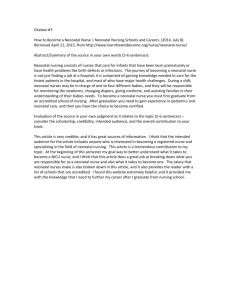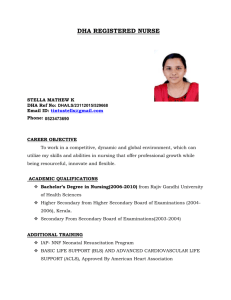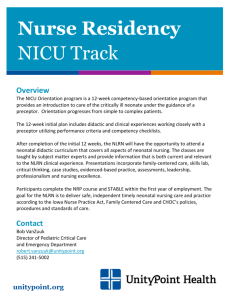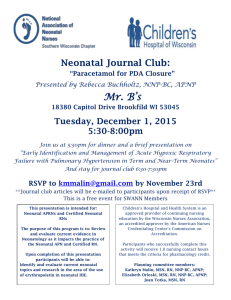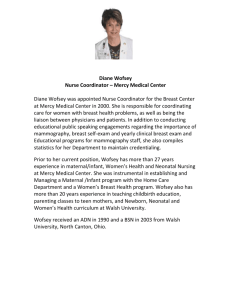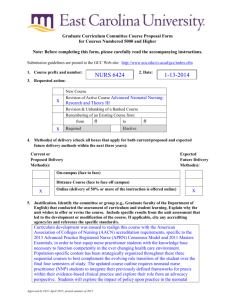Quick Education Guide - Perinatal Services BC
advertisement
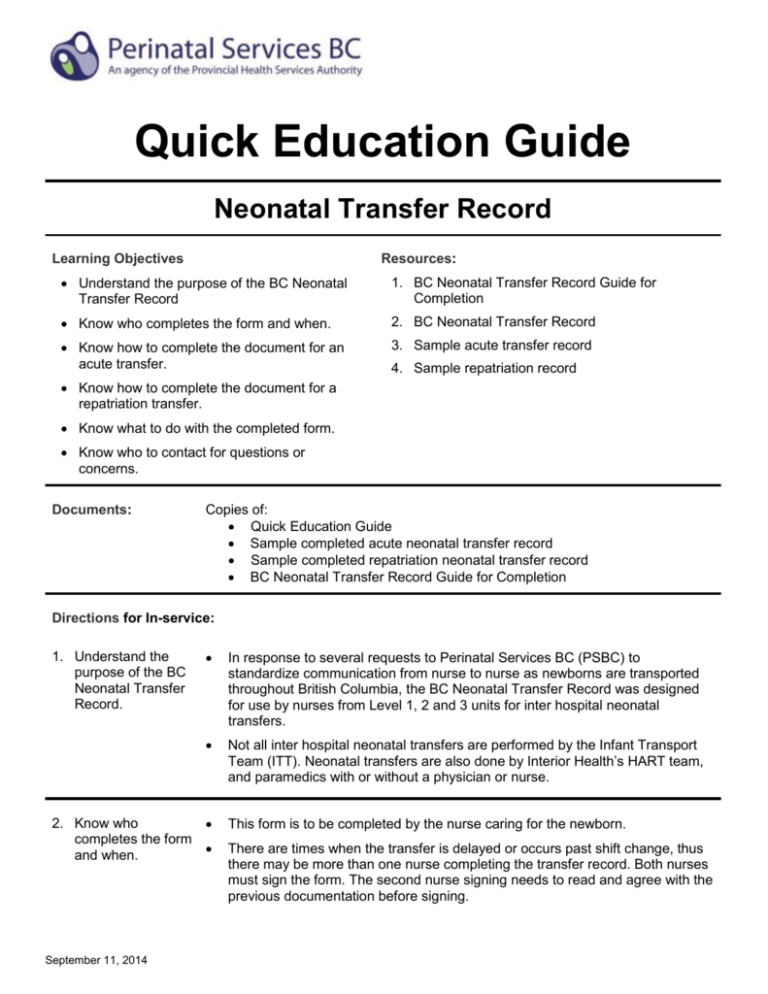
Quick Education Guide Neonatal Transfer Record Learning Objectives Resources: Understand the purpose of the BC Neonatal Transfer Record 1. BC Neonatal Transfer Record Guide for Completion Know who completes the form and when. 2. BC Neonatal Transfer Record Know how to complete the document for an acute transfer. 3. Sample acute transfer record 4. Sample repatriation record Know how to complete the document for a repatriation transfer. Know what to do with the completed form. Know who to contact for questions or concerns. Documents: Copies of: Quick Education Guide Sample completed acute neonatal transfer record Sample completed repatriation neonatal transfer record BC Neonatal Transfer Record Guide for Completion Directions for In-service: 1. Understand the purpose of the BC Neonatal Transfer Record. In response to several requests to Perinatal Services BC (PSBC) to standardize communication from nurse to nurse as newborns are transported throughout British Columbia, the BC Neonatal Transfer Record was designed for use by nurses from Level 1, 2 and 3 units for inter hospital neonatal transfers. Not all inter hospital neonatal transfers are performed by the Infant Transport Team (ITT). Neonatal transfers are also done by Interior Health’s HART team, and paramedics with or without a physician or nurse. 2. Know who completes the form and when. September 11, 2014 This form is to be completed by the nurse caring for the newborn. There are times when the transfer is delayed or occurs past shift change, thus there may be more than one nurse completing the transfer record. Both nurses must sign the form. The second nurse signing needs to read and agree with the previous documentation before signing. 3. Know how to complete the document for an acute transfer. Refer to sample completed acute neonatal transfer record for the following case. o Transfer date: July 28, 2014 at 1400 hours. o Precipitous birth at a level 2a hospital. Shoulder dystocia with a tight nucal cord. Transferred to a level 3a hospital because of a right sided tension pneumothorax. o Maternal history: G3 T1 P1 A1 L1, GBS positive - mother received antibiotics during labour. o Additional birth history: Born July 28th, 2014 at 1020 hours. 40+2 weeks gestation. Apgars 7 at 1minute, 8 at 5 minutes, 8 at 10 minutes. Birth weight 3100 gms. o Infant history: Developed increased respiratory distress soon after birth. Transferred to Royal Columbian Hospital for a diagnosed right sided tension pneumothorax. Chest tube inserted and attached to drainage system prior to transport. Investigating for aspiration or GBS pneumonia. 4. Know how to complete the document for a repatriation transfer. Refer to sample completed repatriation neonatal transfer record for the following case. o Transfer date: May 13, 2014 at 1530 hours o 28 week gestation infant born at Victoria General Hospital (VGH) via C/S for complete placenta previa. o Maternal history: G3 A1 L1. Family lives in Nanaimo. o Birth history: Born April 10 at 0135. 28 weeks gestation. Apgars 4, 6 and 8. Birth weight 1432 gms. o Infant being repatriated to Nanaimo Regional General Hospital (NRGH) NICU following almost five weeks in VGH NICU. Infant is well, growing, no medical/surgical concerns. Current weight 2582 gms, PMA 32+5 weeks. o Infant history: Occasional apnea and bradycardia spells. Remaining on caffeine 7mg/kg = 18mg PO Q24h. Normal echo, normal HUS. Feeds 160/mLs/kg/day breast/ bottle/tube. No immunizations administered to date. PKU done. Hearing screen not done. Audiology available in NRGH. Eye exam carried out no follow up required, no ophthalmology available in NRGH so appropriate to transfer at this time. To ensure optimal effective communication, the nurse must copy this record (original to stay on the chart). Scanning or faxing this form is also an option – which would eliminate the need for copying. The photocopied form is given to the transfer team who will hand this form to the receiving hospital’s nurse to facilitate communication and continuity of nursing care. This form does not replace the telephone report – an essential component of the nurse to nurse handover. << insert educator’s name and contact info >> 5. Know what to do with the completed form. 6. Know who to contact for questions or concerns. September 11, 2014
